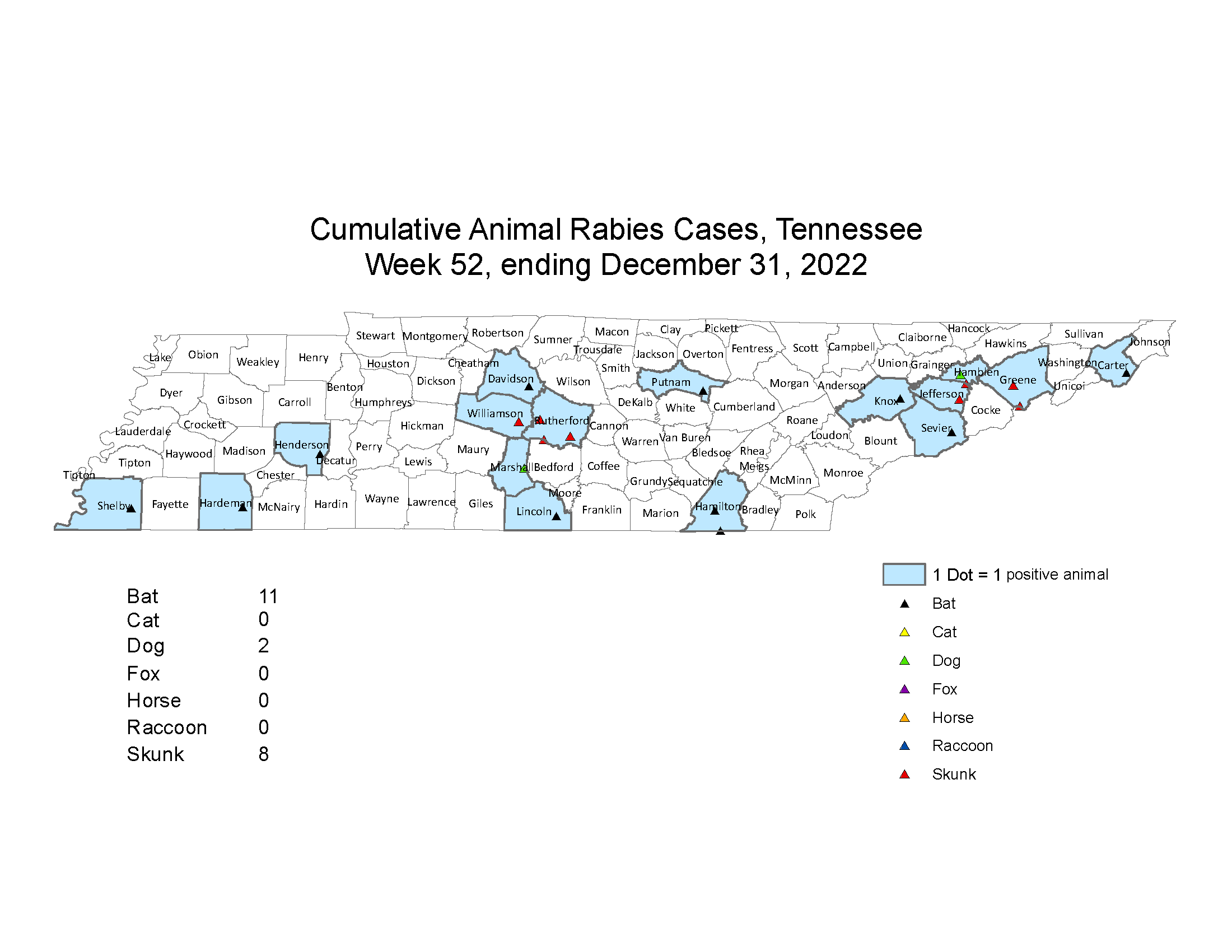TOXICOLOGY QUESTION OF THE WEEK
FEBRUARY 3, 2023
Is there animal rabies in TN?
The answer is yes! The Tennessee (TN) Department of Health continually monitors the number of verified cases of animal rabies in the state. The common reservoir in the state is typically skunk, although bats were the most common species documented for the 2022 calendar year (see attachment of cumulative animal rabies cases).
Rabies is a neurotropic virus that is present in the saliva and nervous tissue of an infected animal. After a bite, the virus replicates in the muscle tissue near the inoculation. Entry into the neuron occurs at the neuromuscular junction. Retrograde axonal transport moves the virus from the peripheral nervous system to the central nervous system.
If a human is bitten by a dog, cat, or ferret, the animal should be confined and observed for 10 days. If the animal remains healthy, then the human does not need postexposure prophylaxis. Bite exposures from wild carnivores warrant post-exposure prophylaxis. Bites from small rodents or lagomorphs (rabbits) do not.
Postexposure prophylaxis for those individuals who have not been previously vaccinated includes administration of the human rabies immune globulin (HRIG) for passive immunity and administration of the rabies vaccine on days 0, 3,7, and 14. For those who are immunocompromised, a 5th dose of the vaccine is given on day 28. If a person has been previously vaccinated, they receive the rabies vaccines as boosters on days 0 and 3 and NO HRIG. Ideally, postexposure prophylaxis is given within 5-10 days of high-risk exposure.1
Of note, HRIG and the rabies vaccines are not stocked at the local health departments. Not all hospitals in TN carry HRIG or rabies vaccines. The TN Department of Health has a map on their rabies website that lists the medical centers that carry the HRIG and vaccine.
TN law requires that dogs and cats over 6 months of age are currently vaccinated against rabies. There is an oral rabies vaccine that is approved for use in wild raccoons and coyotes. These bait packets are sometimes distributed in Tennessee to reduce the rabies prevalence in the wild raccoon population.
If one needs assistance determining if someone needs rabies postexposure prophylaxis, contact the local health department or contact the TN Department of Health at 615-741-7247.
- Use of a reduced (4 dose) vaccine schedule for postexposure prophylaxis to prevent human rabies. Recommendations of the advisory committee on immunization practices. MMWR 2010;59(No. RR-2):1-10.
- https://www.tn.gov/health/cedep/zoonotic-diseases/rabies.html

Question submitted by Saralyn William MD, Professor of Emergency Medicine, Medicine, and Pediatrics. VUMC
I am interested in any questions you would like addressed in the Question of the Week. Please email me with any suggestions at donna.seger@vumc.org.
DONNA SEGER, MD
Professor Emeritus
Department of Medicine
VUMC
|
|
TENNESSEE POISON CENTER 24/7 FREE MEDICAL HOTLINE
POISON HELP | 800.222.1222 |